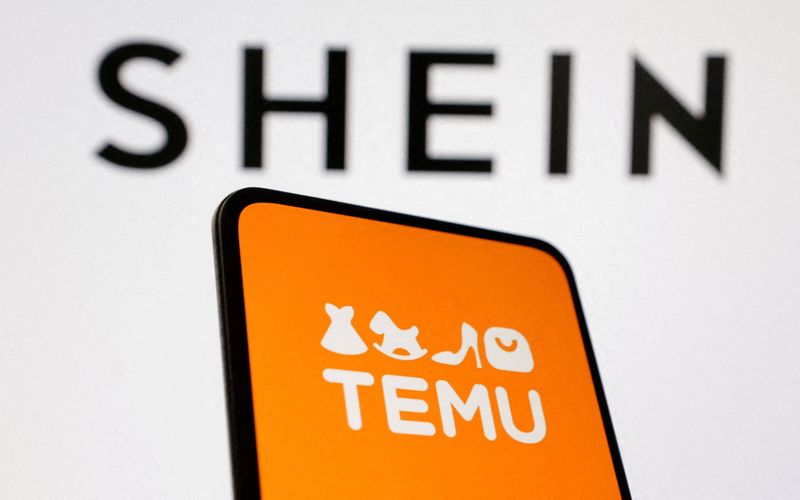Analysis-Black Friday: online marketing costs jump in bidding war with Temu and Shein
2024.11.27 01:21
By Helen Reid
LONDON (Reuters) – Heavy online marketing spending by Temu and Shein is making it more costly for other retailers and brands to reach shoppers on Black Friday, marketing and industry experts say, with both platforms bidding heavily on search keywords used by competitors.
Typing a few words into a search engine is a key starting point for shoppers looking online for gifts or buying for themselves in Black Friday sales, the unofficial start of the holiday shopping season on the day after U.S. Thanksgiving.
Retailers compete for their advertised products to appear high up in online search results, by bidding on keywords. The greater the demand for a keyword, the more the search engine charges for each click on an ad appearing in those results – a metric called “cost per click”.
In the United States, for example, Temu has bid on keywords including “Walmart (NYSE:) Black Friday deals”, “Kohls Black Friday”, and “Bed Bath Beyond”, according to data on Google (NASDAQ:) search ads compiled by online marketing platform Semrush for Reuters.
Shein has bid on keywords including “Walmart clothes”, “Zara jeans”, “Mango dresses”, and “Nordstrom (NYSE:) Rack shoes” in the U.S., the data showed. The cost per click for “Walmart clothes” increased by 16 times from August 2022 to August 2024.
Generic keywords like “cheap clothes online” and “shopping”, have also become much more costly, the data showed.
“It’s brutal out there, it’s really hard,” said Erik Lautier, ecommerce expert at consultancy AlixPartners.
“By definition, when you increase the cost per click, the return on your marketing investment decreases. In some cases, that may mean it becomes unprofitable, and that can be highly impactful for retailers that depend on paid search ads to drive their business.”
Paid search ads can drive anywhere from 15% to 30% or more of a retailer’s online sales, and account for as much as half of the marketing budget, Lautier said.
‘AGGRESSIVE’
Brands bidding on other brands’ keywords is not unusual, but Shein and Temu stand out because they bid on a much wider range of competitors’ keywords than average, said Olga Andrienko, vice president of brand marketing at Semrush.
“We are seeing a fundamental shift in search marketing dynamics and the fast fashion brands are now outbidding the traditional retailers, and it does look like their strategies are a lot more aggressive,” she said.
In response to Reuters’ questions, a Temu spokesperson said that the platform is committed to fair competition and responsible advertising practices, and maintains a “negative keyword list” to prevent ad targeting of brand names.
“In rare instances, brand names may inadvertently be included in our campaigns due to automated keyword insertion processes on ad platforms like Google,” the spokesperson said, adding that Temu acts quickly to address these occurrences.
Shein did not immediately reply to a request for comment.
The rising costs are driving some businesses to shift marketing spend away from paid search and into other channels like Facebook (NASDAQ:), TikTok, influencers, and traditional advertising, said Erin Brookes, head of the retail and consumer practice at Alvarez & Marsal in London.

“I’ve seen many brands really start to think, actually, that activity maybe gets us a customer that we don’t want – a customer who is trading on price only, not a high-margin customer who is coming back – and I want to invest in bringing a more targeted customer into the brand,” Brookes said.
British online fast fashion retailer Asos this month announced a new loyalty programme, part of its marketing efforts to reach customers “in more engaging and emotional ways” using cinema ads and influencers too, chief customer officer Dan Elton said, adding that performance marketing is “just one piece of the puzzle”.







